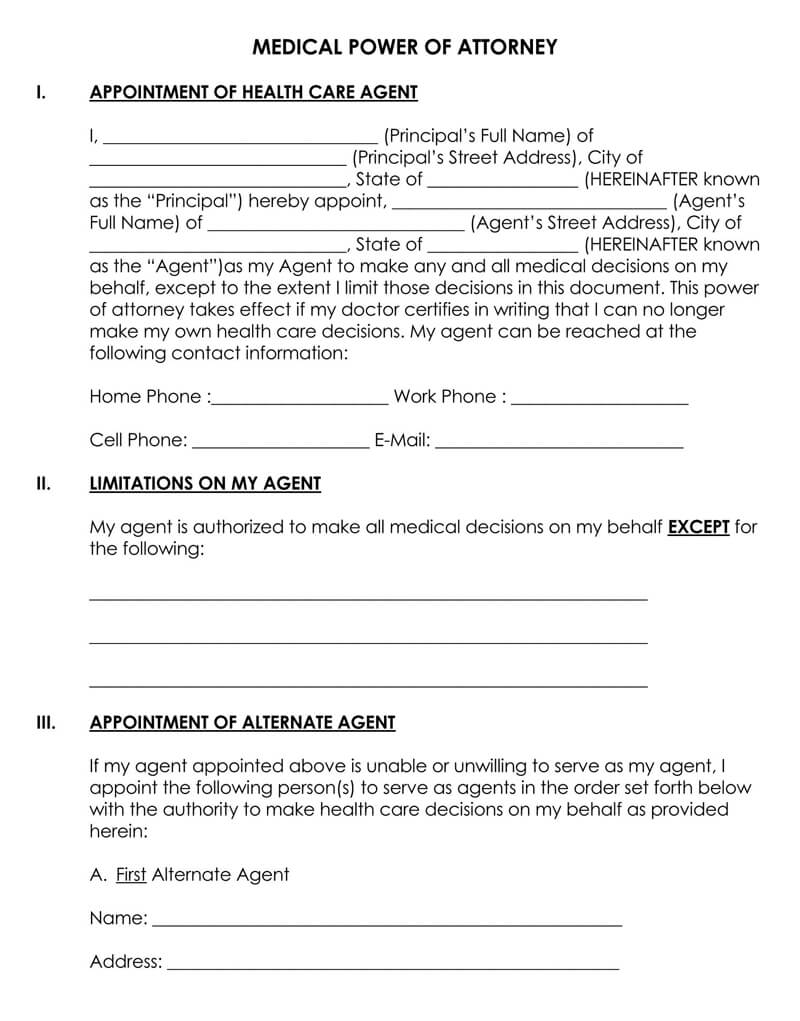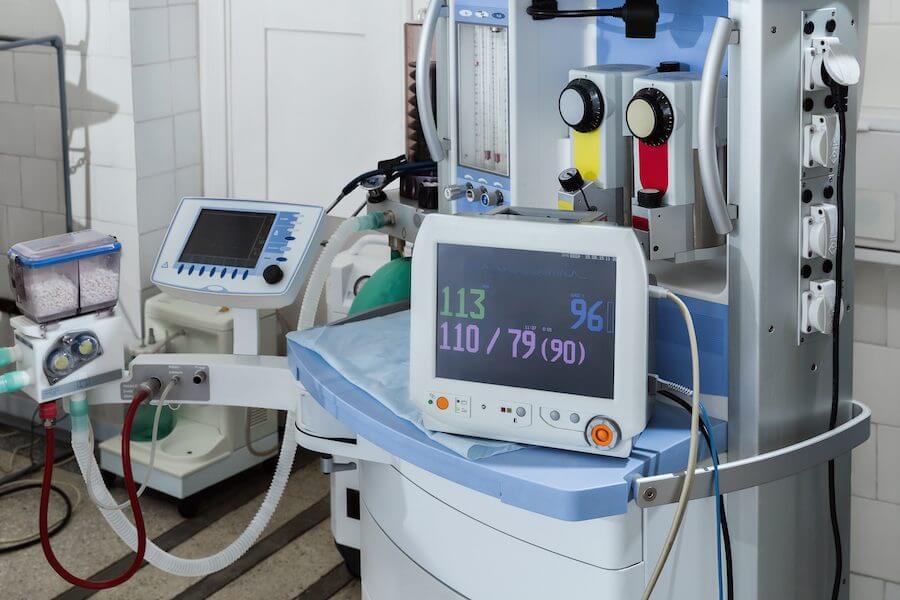Some sicknesses may take too much of a toll on the patients concerned. These include Alzheimer’s, Parkinson’s disease, and vegetative state. Obviously, it is impossible for a patient suffering from these illnesses to make radical and far-reaching decisions. It is only by delegating the same to a competent person that sound decisions may be realized. This power gives a patient the leeway to delegate the said responsibility. It makes the patient appoint someone who is mentally stable to carry on at the point of his incapacitation onwards. Such a person has to be trustworthy enough to act within the best interest of the patient concerned.
A Medical Power of Attorney is a document that grants someone (attorney) the authority to make medical decisions on behalf of someone else (principal).
Free Medical POA Forms (By State)
Choose the required form & State from the list below to create the required form by using a step-by-step wizard or download the form for the required state:
Sample Medical POA Form
Provided below is a sample of the form for your ease of use:

A medical POA is effective provided a licensed physician deems the principal is incapable of making medical decisions themselves.
In the absence of a Medical Power of Attorney, family or friends may have to seek a court’s approval to make medical decisions on behalf of a relative upon incapacitation. This demonstrates the importance of a Medical Power of Attorney. It is often accompanied by a living will that outlines someone’s preferences in terms of life-sustaining and end-of-life medical procedures. A living will be a point of reference for the appointed attorney when making medical decisions for you.
This power goes by other names. These names are outlined hereunder:
- Medical Power of Attorney Directive
- Durable Power of Attorney for Health Care
- Health Care Power of Attorney
- Advance Health Care Directive
- Advance Directive
- Health Care Proxy
Associated Terminology
Some terms and languages are used to convey or exercise this power. These are the key terms in the field:
- Incapacity- Incapacity refers to the physical and mental inability to carry out some affairs. When such happens, the person affected may not always be able to carry out critical decisions or express their wishes succinctly as the need may so determine or dictate.
- Pre-arrangement- Pre-arrangement is the fact that the ‘medical POA may be drafted well in advance before the incapacitation arises. It, however, ‘waits’ until the incapacitation arises for it to become effective. Pre-arrangement exists to prevent any loopholes or grey areas whenever the incapacitation eventually arises.
- Attorney-in-fact- An attorney-in-fact is a person whom a patient appoints to make crucial medical decisions on his behalf. He goes by the alternate names of ‘agent,’ or ‘representative.’ This person is bound to follow the laid down regulations and to act with the best interest of the patient at heart.
‘Living Will’ Vs ‘Medical POA’
A ‘living will’ lets the person concerned expressly state his preferences or wished for the end-of-life medical care in case they happen to be too incapacitated to make such decisions on their own later on. It has no power after the death of the patient.
The ‘medical power of attorney,’ however, delegates the role to a third party. POA is someone of a sound mind, preferably related to the patient, and is trustworthy enough to act within the best wishes of the patient concerned.
Signing Requirements
To validate the agreement, both parties must give approval through their signatures. This requirement will often vary from one State to the other. Below are the different signing requirements for every state and the laws that dictate the requirement:
| State | Signing Requirements | Laws |
| Alabama | Two (2) Witnesses | § 22-8A-4(c)(4) |
| Alaska | Notary Public or Two (2) Witnesses | AS 13.52.010(b) |
| Arizona | Notary Public or One (1) Witness | § 36-3221(A)(3) |
| Arkansas | Notary Public or Two (2) Witnesses | § 20-6-103(c) |
| California | Notary Public or Two (2) Witnesses | § 4701(e) |
| Colorado | No law (Notary Public recommended) | § 15-14-506 |
| Connecticut | Two (2) Witnesses | § 19a-575 |
| Delaware | Two (2) Witnesses | § 2503(b)(1)(d) |
| Florida | Two (2) Witnesses | § 765.202(1) |
| Georgia | Two (2) Witnesses | § 31-32-5 |
| Hawaii | Notary Public and Two (2) Witnesses | § 327E-3(1) |
| Idaho | No law (Notary Public recommended) | § 39-4510 |
| Illinois | One (1) Witness | 755 ILCS 45/4-5.1 |
| Indiana | One (1) Witness | § 16-36-1-7(b)(3) |
| Iowa | Notary Public or Two (2) Witnesses | § 144B.3(b) |
| Kansas | Notary Public and Two (2) Witnesses | § 58-632 |
| Kentucky | Notary Public or Two (2) Witnesses | § 311.625(2) |
| Louisiana | Two (2) Witnesses | § 224 (A) |
| Maine | Two (2) Witnesses | § 5-803(2) |
| Maryland | Two (2) Witnesses | § 5–603 |
| Massachusetts | Two (2) Witnesses | § 201D-2 |
| Michigan | Two (2) Witnesses | § 700.5506(4) |
| Minnesota | Notary Public or Two (2) Witnesses | § 145C.03(5) |
| Mississippi | Notary Public or Two (2) Witnesses | § 41-41-205(2) |
| Missouri | Notary Public | § 404.705(3) |
| Montana | Two (2) Witnesses | § 50-9-103 |
| Nebraska | Notary Public or Two (2) Witnesses | § 30-3404(5) |
| Nevada | Notary Public or Two (2) Witnesses | NRS 162A.790 |
| New Hampshire | Notary Public or Two (2) Witnesses | § 137-J:14 |
| New Jersey | Notary Public or Two (2) Witnesses | § 26:2H-56 |
| New Mexico | Two (2) Witnesses | § 24-7A-4 |
| New York | Two (2) Witnesses | PBH § 2981 |
| North Carolina | Notary Public and Two (2) Witnesses | § 32A-16A(3) |
| North Dakota | Notary Public or Two (2) Witnesses | § 23-06.5-05(d) |
| Ohio | Notary Public or Two (2) Witnesses | § 1337.12(1)(b) |
| Oklahoma | Two (2) Witnesses | 63 O.S. § 3101.4(A) |
| Oregon | Notary Public or Two (2) Witnesses | § 127.515(2) |
| Pennsylvania | Two (2) Witnesses | § 5452(b)(2) |
| Rhode Island | Notary Public or Two (2) Witnesses | § 23-4.10-2(9) |
| South Carolina | Notary Public and Two (2) Witnesses | § 62-5-517 |
| South Dakota | Notary Public or Two (2) Witnesses | § 34-12D-2 |
| Tennessee | Notary Public or Two (2) Witnesses | § 34-6-203(a)(3) |
| Texas | Two (2) Witnesses | § 166.154 |
| Utah | One (1) Witness | § 75-2a-107(c) |
| Vermont | Two (2) Witnesses | § 9703(b) |
| Virginia | Two (2) Witnesses | § 54.1-2983 |
| Washington | Notary Public or Two (2) Witnesses | § 70.122.030 |
| West Virginia | Notary Public and Two (2) Witnesses | § 16-30-4(a) |
| Wisconsin | Two (2) Witnesses | § 155.10(1)(c) |
| Wyoming | Notary Public or Two (2) Witnesses | § 35-22-403(b) |
Getting a Medical POA
Acquiring a legal Medical POA involves several steps, from preparation to signing. It becomes effective once it has been signed. Below are the steps you can follow when writing your Medical POA:
Components of a medical POA
The foremost step should be to determine and understand the contents to be included in a Medical POA. They include:
- The name (s) and contact information of your primary attorney-in-fact, which includes their address information.
- The name and contact information of your alternate (if any) Attorneys-in-fact.
- A HIPPA Release that allows your attending care provider to openly communicate with your attorney so as to help him or her understand your medical condition and medical alternatives available. It also gives the attorney access to your medical records.
- A list of all the powers bestowed on the attorney-in-fact.
- An Options guidance for your attorney which outlines the options on which your attorney should base their decisions on- in simpler terms, what is most important to you should you become terminally ill. Some people would prefer comfort, to stay alive as long as possible, or to preserve their mental functions. One can outline the aggressive measures they would rather not be subjected to.
- An advance health care directive, for example, a Living will. It should highlight the principal’s directives/instructions on how they would like to be treated should they become permanently unconscious or be at an end-stage medical condition. Some people prefer comfort and quality of life to simply being revived.
- An option to approve organ or tissue donation.
- The Principal’s and witnesses’ signatures
- Notarization section.
Understanding the importance of every component is very imperative in coming up with an effective Medical POA.
Select the agent
Legally, most states require that the agent be eighteen years or older, mentally competent, and should not be financially invested or an employee of the medical institution the principal is being admitted to.
As an agent is meant to represent with your best interest in mind, the family member, friend, or colleague you select should have the following traits:
- Be trustworthy that they will make decisions in your best interests.
- Be informed about your preferential treatment, religious and moral beliefs.
- Be emotionally capable and enduring to make difficult decisions.
- Be willing to be responsible for the obligations at hand.
- Be available to work hand in hand with your physician(s).
Having someone who is aware of your medical history is an added advantage. As the principal, you can choose to include the following items:
- Successor agent- This is usually an alternative attorney provided should the primary agent fail to fulfill their responsibilities. Co-agent authority is usually not permitted; medical decisions are the responsibility of one person.
- Compensation agent- The principal, at his or her convenience, can allocate compensation for the attorney for expenditures such as food, lodging, and travel during their operating time.
The next step is to define your attorney’s authority. The extent of an attorney’s powers is dependent on the Principal’s will. One can allow the attorney to make decisions regardless of the situation at hand or can choose to limit the attorney to specific decision-making scenarios. Therefore, it is up to you, the Principal, to define your agent’s authority. The more detailed you are, the better.
The agent’s powers should be outlined for the following scenarios:
- Surgical Treatments
- Hospitalization
- Medical Treatment
- Nursing Home Treatment/Care
- Home-Stay Care
- Organ Donation
- Psychiatric Treatment
- End of Life Decisions
- Sign the form following your state’s requirements
- Include other advance directive order
Any other advance directive order required or necessary should then be included in the document. It can be a Do-Not-Resuscitate form or a Living will. In some states, a Living will is a requirement. The document is normally attached to the Medical POA to simplify accessibility by the agent or healthcare professional.
Sign following the State’s requirements
The subsequent step should be the signing of the document. The associated parties (the Principal and Agent) are required to sign as directed by their State Signing Laws. The Medical POA must comply with the Principal’s state’s signing requirements. This is to make the document legally binding, valid, and recognized by the state.
Distribute copies
After the Medical POA has been validated in the presence of witnesses or a notary public sign, the Principal keeps the original document, and copies can be made for the following parties:
- Primary agent
- Alternate agent
- Primary physician/health caregiver
- Loved ones, that is, spouses, family, etc.
- Witnesses
- Healthcare institutions where the Principal receives care
- Residential / palliative care facilities the Principal might be living in.
Distribution of copies is ordinarily the final step of effecting a Medical POA.
When Do You Need a Medical POA?
A Medical POA can be used by all Americans aged 18 years and above. However, the need for one will vary from one profession to the other, age, and events.
Following are the situations that require a medical POA:
- Extremely Elderly- You will need this legal power when you are extremely elderly. As people approach their sunset years, they lose the power to make sound and rational decisions on their own. To be able to ‘make’ similar decisions as they age, the intervention of a person of sound mind badly comes in.
- Risky Careers- Some careers like aviation, mining, chemical engineering, military, and space exploration are too risky. Those who pursue them are often at the risk of dying at any time. Such a person needs to delegate the powers to a person who is in a less risky career to help out.
- Terminally Ill- If you are terminally ill, i.e. have a sickness that is incurable, you yet again have to invoke the assistance of a healthy person. This person has to be able to make critical and far-reaching decisions that are in your best interest at a time when you no longer have that ability yourself.
- Mental Instability- The same case above applies to mental instability. A mentally unstable person cannot definitely make far-reaching medical decisions on his own. That is why the person has to seek the assistance of another person to do the same for him.
- Medical Reasons- Other categories of people who normally use Medical POAs are;
- The elderly.
- Individuals planning on having a high-risk surgery in the near future.
- Alzheimer’s, Dementia, and other mental illness patients.
Other reasons are as follow:
- Military personnel deployed overseas.
- Traveling abroad, for business or pleasure, for a significant amount of time.
- Diagnosed with a chronic or terminal condition or disease.
- A participant in extreme sports or activities.
- In a high-risk profession.
Legal Advice and Considerations
As you leverage this power, there are several issues you have to factor. Below are the common issues you have to take care of:
- State Laws- The laws that govern this power vary significantly from one state to another. You have to be familiar with the laws that exist in your state as you do not want to ruffle feathers with the authorities. You may have to bring in an attorney to help with compliance with these laws.
- Notarization- Though largely unnecessary, it is also advisable that you get the form notarized by a notary public. Notarization is to make the form legally binding and widely acceptable. In this way, you will also get to dispel any disputes or ambiguities which may arise in the course of its implementation.
- Lawyers- As we have already hinted, lawyers are not necessary for the entire process of drafting and implementing the document. However, you will find their intervention useful and necessary when filing and executing the form as the language you use has to be clearly understood.
- Grounds- You have to clearly spell out the grounds on which the form has to be invoked, and the attorney-in-fact has to come in. These grounds have to be legitimate and stipulated for the avoidance of any ambiguities in the course of execution.
- Procedures- Lastly, you have to know and follow the procedures involved in the letter. The processes are just as good as the intent and purposes of the document itself. Skipping a step may also render the entire document null and void to the extent of missing out on that very step.
When drafting a Medical Power of Attorney, you should put legal considerations into account. This is in terms of liability, state laws, and the power to revoke. To expound on this, we shall look into these legal considerations.
- Attorney In-fact Liability- Legally, the attorney-in-fact is not liable for any medical decisions they make on your behalf with the power vested to them by a Medical Power of Attorney. This is why it is important to select an attorney you trust and who, to a great extent, knows your values, beliefs, and wishes. Ensure the attorney has your best interests at heart. You can also choose more than one attorney for the following reason; in case one of the attorneys is incapable or unavailable to make decisions. Always keep in mind that the attorney-in-fact under a Medical P is acting in good faith.
- Scope of Medical POA- The scope of a Medical POA will always vary from one state to another. Therefore, it is important to familiarize yourself with the applicable rules and regulations in your state before delegating powers to the attorney. Different states will often require the Medical POA to include a specific language (jargon) in order to be validated by law. The principal should make an effort to understand the laws. Sometimes, as a requirement, the state might require a Medical POA to be combined with an ‘advance health care directive’ such as a living will. This should be ascertained so as appropriate steps are taken.
- The power to revoke- A principal can revoke a Medical POA at their convenience, provided they are in a legal capacity to act. However, if the principal becomes incapacitated before revoking a Medical POA, another party with the principal’s best interests in mind like a relative, close friend, or business colleague can petition a local court to be appointed as the Principal’s ‘conservator,’ which automatically revokes every pre-existing Medical POA.
Additional considerations
Should a person become physically and mentally incapable of making medical decisions for themselves, and there is they do not have a Medical POA in place, several people are allowed by law to make these decisions on their behalf.
They include:
- A court-appointed guardian or conservator;
- A husband, wife, or domestic partner;
- An adult child;
- An adult brother or sister;
- A close friend; or
- Your closest relative.
This list is given in order of priority and authority, a court-appointed supervisor being the first option. In the absence of either of the persons, the Principal’s attending physician is legally allowed to select another person or entity such as a public guardian, public agency, corporation, or any other permitted by law.
Frequently Asked Questions
No. Their only responsibility is to make medical decisions on your behalf. They can only make financial decisions if you have given the durable POA over your finances.
Yes. You can choose additional agents, known as successor agents. However, they can only make decisions if the primary attorney is unable, unwilling, or unavailable.
Yes. They are allowed to under the HIPAA Privacy Rule 45 CFR 164.524. This is to help them make better decisions.
In most cases, a notary public must sign. However, in other states, witness(es) would suffice, usually two witnesses.
Should you become incapacitated and do not have a Medical POA, your spouse, family member, close friend, or colleague is tasked to do that for you. Sadly though, this might be someone who does not have your best interests at heart and might not be favorable.
Yes. In most states, spouses of married couples can make medical decisions on behalf of their partner in the absence of a Medical POA. However, if the POA states someone else to do so, it should be respected.
Conclusion
A Medical POA grants a person the authority to make medical decisions on behalf of another person. This is necessary in the event someone becomes mentally or physically incapable of communicating their wishes in terms of health. A Medical POA can be beneficial to people who work in high-risk professions or the elderly. The Attorney to make decisions on behalf of the Principal must always put the Principal’s best interest first. A Medical POA can grant the agent power to make decisions in any situation or can be limiting. You can choose an attorney from your family members, close friends, or colleagues.












